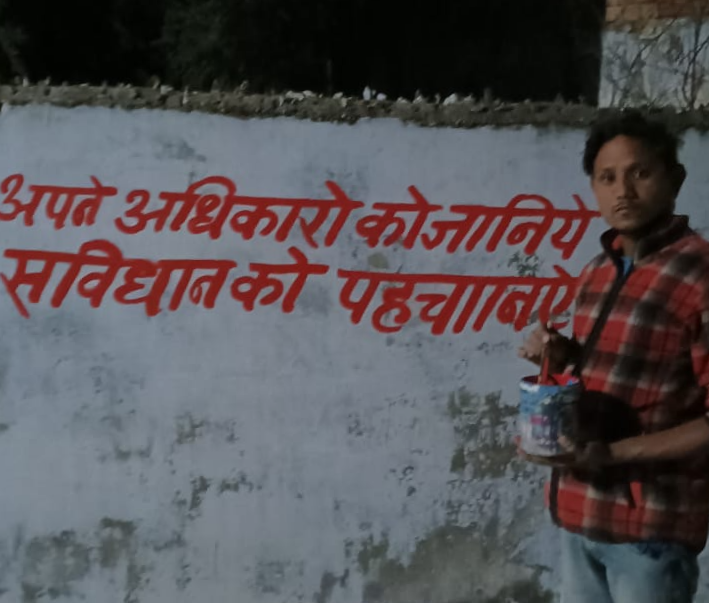A Step Towards Equality
- We, The People Abhiyan

- Aug 1, 2025
- 3 min read

“तू हर घड़े में हाथ क्यों डाल रहा है?”
“Why are you putting your hand in every pot?”
These words left Pawan confused, shocked, and in anger. In Mundru village of Sikar district, Rajasthan, it was the season of digging dried moongfali from the fields. Pawan, like every year, went to collect the dried peanuts. Thirsty, he went to drink the water from the earthen pot, where everybody else was sitting and drinking. The first time, there was silent discomfort. But the next time, someone stopped him from touching the earthen pot.
“तुझे पता है तू कहाँ से आता है और क्या है?”
“Do you even know where you come from and what you are?”
They reminded him of his caste. He came home and told his parents, and vowed never to work again in that field. However, the words remained with him, along with the question - why?
In the village, he had often seen a man named Sanju surrounded by others, discussing things people usually avoided - rape cases, caste atrocities, stories of injustice from far and near. One day, he saw them raising slogans against the elected representatives and giving a petition to the Sub-Divisional Officer about the recent rape case that had happened. He also joined them and felt a sense of belonging. The team became a voice not just for the injustices he saw around him, but also for the one he had been quietly carrying within. With this, he joined the organisation - Ambedkar Yuva Shakti Sangthan.
While working in the organisation, he found himself surrounded by new words, ideas, and discussions - all unfamiliar, and all stirring questions in his mind. He would go to nearby schools and villages, putting up posters of the Preamble. But he would still wonder - Why this Preamble? What did these words really mean? Why should we care?
Often, he'd listen to Sanju talk about local issues - the absence of Dalits in Gram Sabhas, the lack of women in village discussions, and other issues of their village. Pawan listened, but couldn’t yet connect.
Things took a turn when Pawan participated in a training with We, The People Abhiyan in collaboration with Maanviya Mulya Sansthan. Learning about constitutional values and applying it to the issues was the highlight for him. He started recalling the local issues he would often hear in the meetings. With the island activity, where each group had to create their own constitution for an imaginary island, Pawan was surprised when his group's listing of what mattered most - equality, dignity, and equal voice was similar to the values of the Indian Constitution. The dots clicked.
Motivated to now implement solutions, he started with himself. In the organisation, working with people across identities, eating together, talking, Pawan began to realise that everyone is equal. No matter which community, caste, or gender someone belongs to, we must not treat anyone as inferior or superior.
“अपन को सबको लेकर चलना है।”
“We should include everyone”
became his belief. All persons are to be treated equally, as written in the Constitution.
Soon, he and a group of Dalit youth started attending Gram Sabha meetings. What earlier existed only on paper started becoming real. Pawan talked to villagers, encouraging them to ask questions, learn about planning, and processes. Now, about 15 villagers, including Dalits, attend regularly. They ask questions, demand answers. The Panchayat is no longer just about tea and signatures.
But one gap remains: women’s absence. Even when women are elected, their husbands often take over. And this wasn’t limited to their village, across nearby villages too, it was often the husbands of elected women Sarpanchs who took charge, acting as the de facto head. Pawan has started calling it out. He told the husband of his village’s Sarpanch -
“सरपंच तुम नहीं हो। उन्हें बोलने दो।”
“You are not the Sarpanch. Let her speak.”
And in the last meeting he attended, the woman sarpanch led the session herself. It felt like the Sarpanch's chair finally had its rightful occupant.
Pawan’s journey began from a place of humiliation, but he didn’t stop there. He made efforts not to let it repeat. And in this journey, the Constitution became his strongest tool and its values, his best friends.
The above story has been written and published with the explicit consent of the individual involved. All facts presented are based on WTPA's direct interaction with the individual, ensuring accuracy and integrity in our reporting.

%20(4).png)



Comments